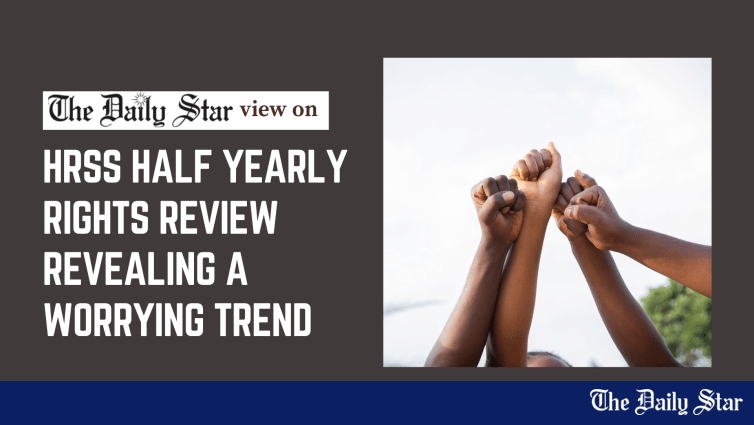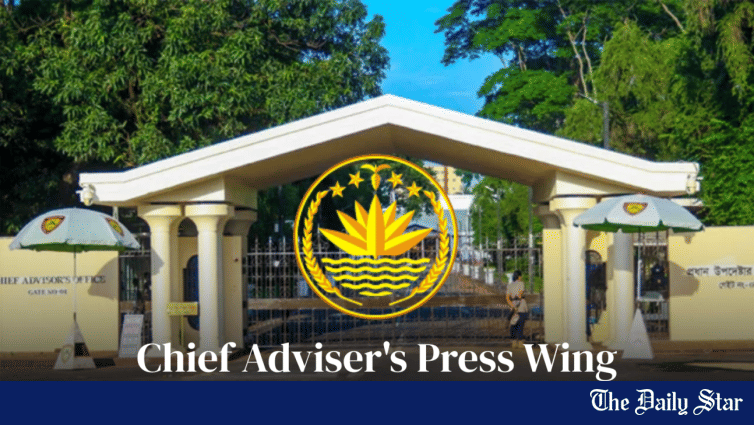- Copy to clipboard
- Thread starter
- #16
Saif
Senior Member
- Messages
- 14,479
- Reaction score
- 7,589
- Origin

- Residence

- Axis Group


Where is the rule of law?
HRSS report paints a grim picture of human rights violations
Where is the rule of law?
HRSS report paints a grim picture of human rights violations

VISUAL: STAR
The latest half-yearly report by the Human Rights Support Society (HRSS) reveals a worrying trend in rights violations during the first half of the year. The rights group has reported an alarming rise in incidents of violence against women and children, including rape, as well as political killings, mob lynchings, assaults on journalists, custodial deaths, and attacks targeting minorities and religious shrines. In addition to these abuses, the report also highlights a sharp increase in crimes such as extortion, theft, snatching, robbery, and murder. Such persistent violations have shaken people's trust in law enforcement in post-uprising Bangladesh, where many had hoped the rule of law would be firmly upheld.
In the first half of the year, at least 1,042 women and girls were reportedly subjected to sexual violence, with an alarming 60 percent of victims being minors. Of the 476 documented rape cases, 292 involved minors. The persistence of these incidents—including the recent rapes in Cumilla and Bhola, the brutal rape and murder of an eight-year-old girl in Magura, and the death of a six-year-old in Munshiganj after a rape attempt—highlights deeper, systemic failures.
The sharp rise in mob violence during this time has also exposed a troubling state of the country's law-and-order situation. According to the report, 141 incidents across Bangladesh led to 67 deaths and 119 injuries. Data from Ain o Salish Kendra reveals that 179 individuals have been killed by mob attacks between August 2024 and June 23 this year. While these figures are deeply alarming, what is equally disturbing is the lack of proper response and accountability from law enforcement agencies.
During the first half of the year, at least 529 incidents of political violence were also reported, leaving 79 dead and over 4,100 injured. The HRSS also documented an alarming rise in custodial deaths and enforced disappearances—40 deaths in jail custody and 14 in law enforcement-related incidents. Journalists also faced mounting threats during this period, with 257 subjected to harassment or assault in 152 incidents. Additionally, legal action was taken against 92 journalists under the Cyber Security Act.
This situation must be reversed. We urge the government to ensure the rule of law across the country. Impunity for violence against women, child abuse, and increasing rape incidents must end, and swift action is needed to curb mob violence. However, restoring justice is not the government's responsibility alone. Political parties and civil society must also step up, as reversing the current trend requires a combined effort. The fundamental and constitutional rights of citizens must be protected through effective control of the law-and-order situation.
HRSS report paints a grim picture of human rights violations
VISUAL: STAR
The latest half-yearly report by the Human Rights Support Society (HRSS) reveals a worrying trend in rights violations during the first half of the year. The rights group has reported an alarming rise in incidents of violence against women and children, including rape, as well as political killings, mob lynchings, assaults on journalists, custodial deaths, and attacks targeting minorities and religious shrines. In addition to these abuses, the report also highlights a sharp increase in crimes such as extortion, theft, snatching, robbery, and murder. Such persistent violations have shaken people's trust in law enforcement in post-uprising Bangladesh, where many had hoped the rule of law would be firmly upheld.
In the first half of the year, at least 1,042 women and girls were reportedly subjected to sexual violence, with an alarming 60 percent of victims being minors. Of the 476 documented rape cases, 292 involved minors. The persistence of these incidents—including the recent rapes in Cumilla and Bhola, the brutal rape and murder of an eight-year-old girl in Magura, and the death of a six-year-old in Munshiganj after a rape attempt—highlights deeper, systemic failures.
The sharp rise in mob violence during this time has also exposed a troubling state of the country's law-and-order situation. According to the report, 141 incidents across Bangladesh led to 67 deaths and 119 injuries. Data from Ain o Salish Kendra reveals that 179 individuals have been killed by mob attacks between August 2024 and June 23 this year. While these figures are deeply alarming, what is equally disturbing is the lack of proper response and accountability from law enforcement agencies.
During the first half of the year, at least 529 incidents of political violence were also reported, leaving 79 dead and over 4,100 injured. The HRSS also documented an alarming rise in custodial deaths and enforced disappearances—40 deaths in jail custody and 14 in law enforcement-related incidents. Journalists also faced mounting threats during this period, with 257 subjected to harassment or assault in 152 incidents. Additionally, legal action was taken against 92 journalists under the Cyber Security Act.
This situation must be reversed. We urge the government to ensure the rule of law across the country. Impunity for violence against women, child abuse, and increasing rape incidents must end, and swift action is needed to curb mob violence. However, restoring justice is not the government's responsibility alone. Political parties and civil society must also step up, as reversing the current trend requires a combined effort. The fundamental and constitutional rights of citizens must be protected through effective control of the law-and-order situation.




